Strategies for Overcoming Leadership Challenges in Healthcare Essay
VerifiedAdded on 2020/10/05
|7
|1494
|466
Essay
AI Summary
This essay delves into the multifaceted challenges of leadership within the healthcare sector, examining the importance of effective leadership in navigating professional threats. It explores strategies to address challenges like influencing colleagues, particularly Registered Nurses (RNs), to improve their skills and report errors, while balancing duties and relationships. The essay discusses the application of adaptive and compassionate leadership approaches to foster collaboration, build trust, and motivate healthcare professionals. It also highlights the importance of setting clear objectives, developing leadership skills through training, and embracing a willingness to learn and adapt. The essay emphasizes the need for responsible healthcare leadership and the significance of learning from mistakes to improve patient care and overall team performance. The student analyzes different leadership styles and their impact on RNs, colleagues and patients.
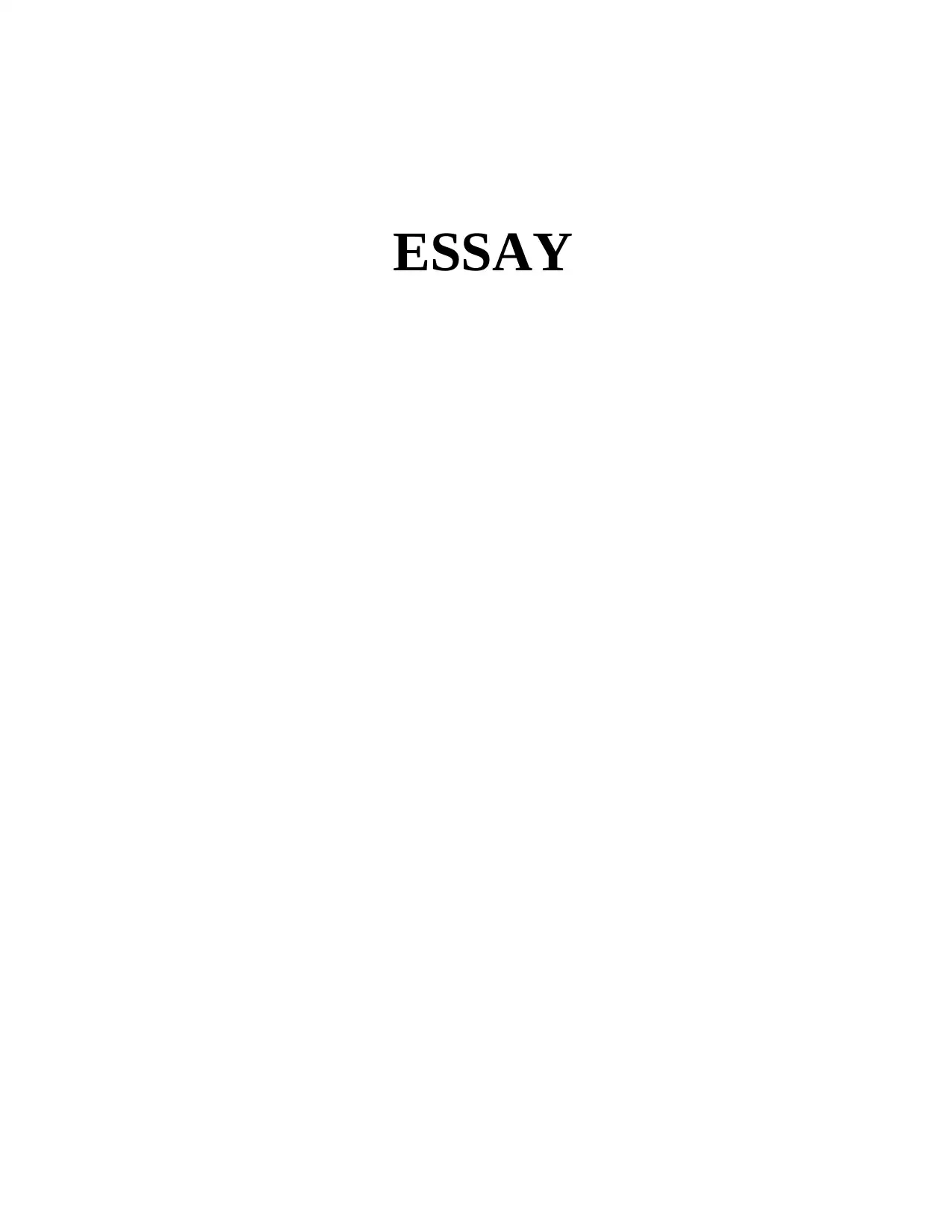
ESSAY
Paraphrase This Document
Need a fresh take? Get an instant paraphrase of this document with our AI Paraphraser
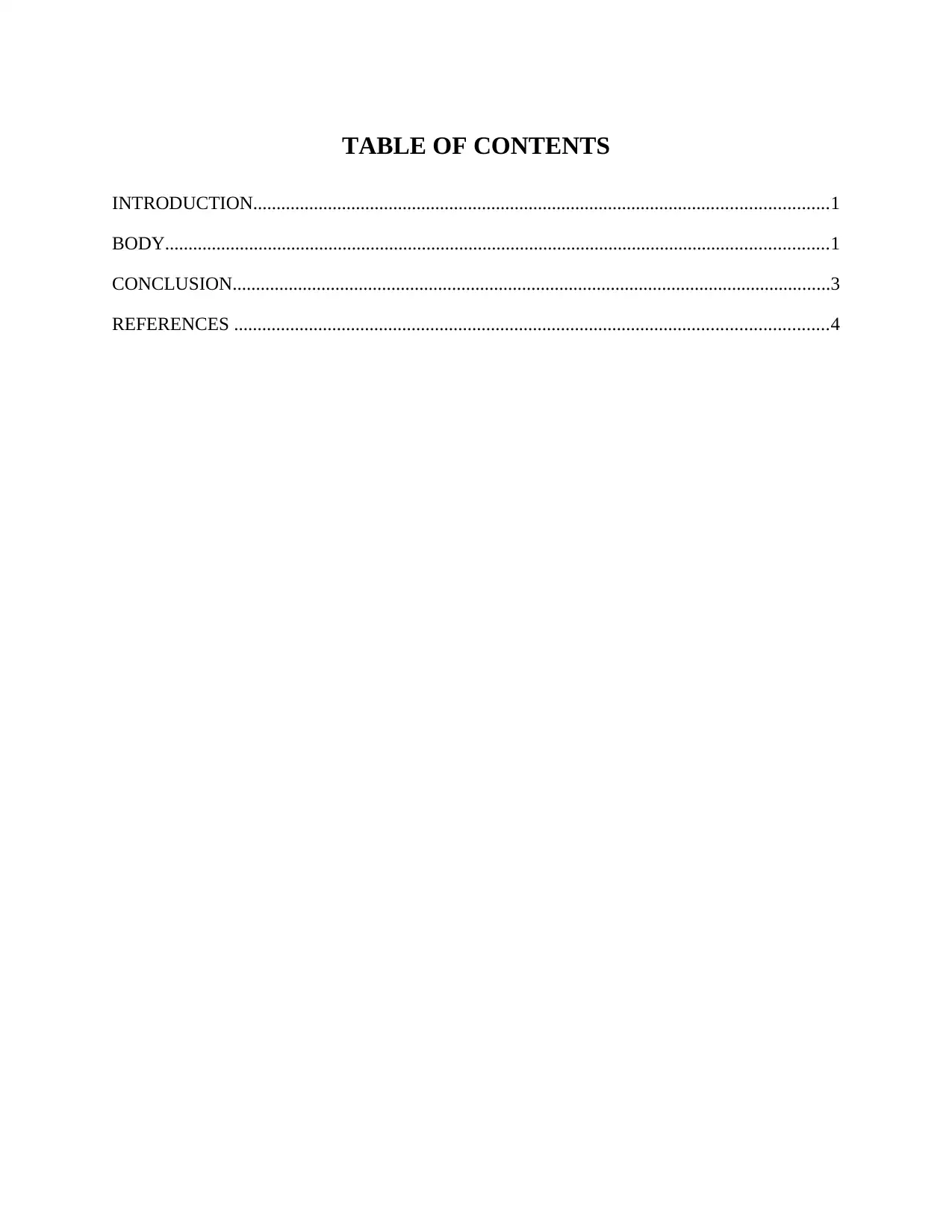
TABLE OF CONTENTS
INTRODUCTION...........................................................................................................................1
BODY..............................................................................................................................................1
CONCLUSION................................................................................................................................3
REFERENCES ...............................................................................................................................4
INTRODUCTION...........................................................................................................................1
BODY..............................................................................................................................................1
CONCLUSION................................................................................................................................3
REFERENCES ...............................................................................................................................4
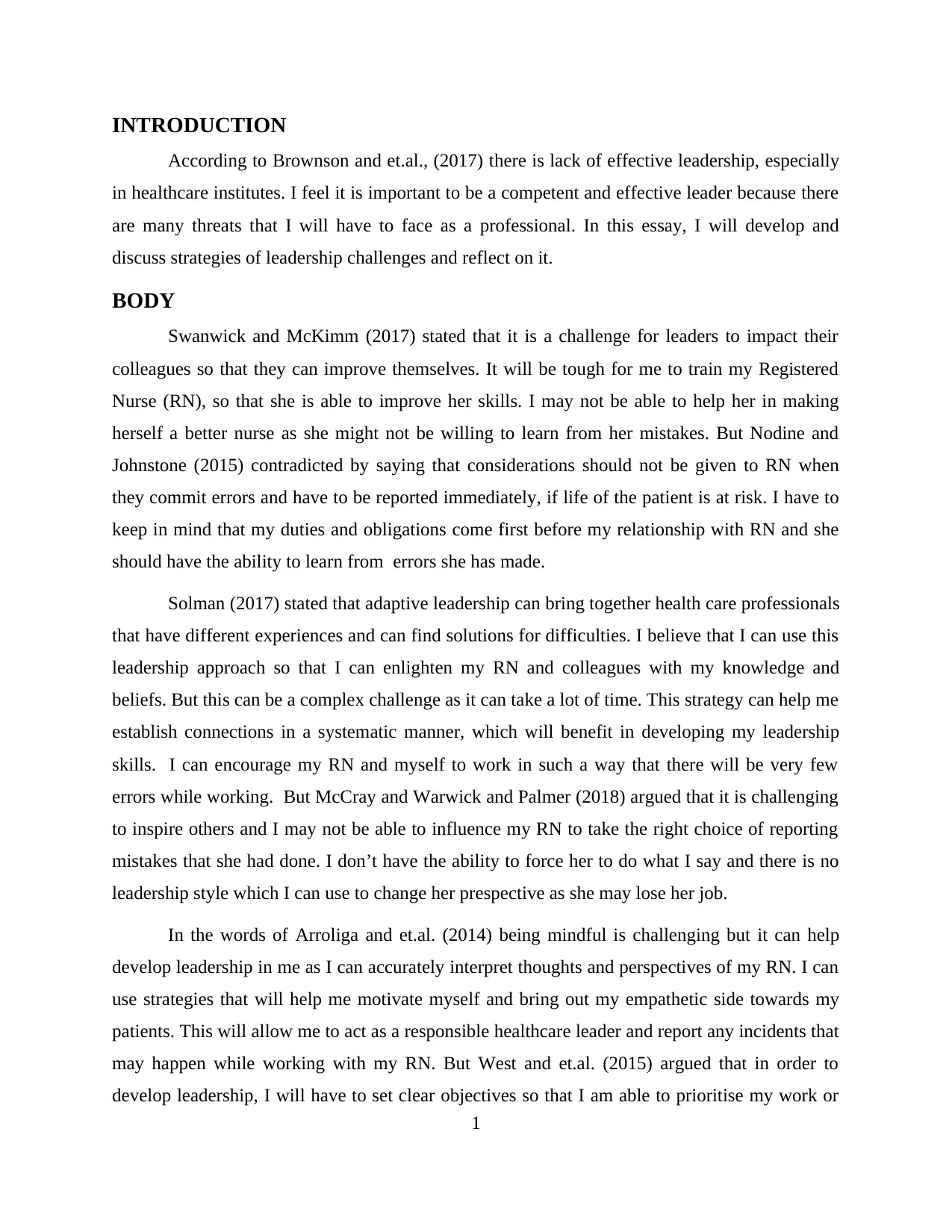
INTRODUCTION
According to Brownson and et.al., (2017) there is lack of effective leadership, especially
in healthcare institutes. I feel it is important to be a competent and effective leader because there
are many threats that I will have to face as a professional. In this essay, I will develop and
discuss strategies of leadership challenges and reflect on it.
BODY
Swanwick and McKimm (2017) stated that it is a challenge for leaders to impact their
colleagues so that they can improve themselves. It will be tough for me to train my Registered
Nurse (RN), so that she is able to improve her skills. I may not be able to help her in making
herself a better nurse as she might not be willing to learn from her mistakes. But Nodine and
Johnstone (2015) contradicted by saying that considerations should not be given to RN when
they commit errors and have to be reported immediately, if life of the patient is at risk. I have to
keep in mind that my duties and obligations come first before my relationship with RN and she
should have the ability to learn from errors she has made.
Solman (2017) stated that adaptive leadership can bring together health care professionals
that have different experiences and can find solutions for difficulties. I believe that I can use this
leadership approach so that I can enlighten my RN and colleagues with my knowledge and
beliefs. But this can be a complex challenge as it can take a lot of time. This strategy can help me
establish connections in a systematic manner, which will benefit in developing my leadership
skills. I can encourage my RN and myself to work in such a way that there will be very few
errors while working. But McCray and Warwick and Palmer (2018) argued that it is challenging
to inspire others and I may not be able to influence my RN to take the right choice of reporting
mistakes that she had done. I don’t have the ability to force her to do what I say and there is no
leadership style which I can use to change her prespective as she may lose her job.
In the words of Arroliga and et.al. (2014) being mindful is challenging but it can help
develop leadership in me as I can accurately interpret thoughts and perspectives of my RN. I can
use strategies that will help me motivate myself and bring out my empathetic side towards my
patients. This will allow me to act as a responsible healthcare leader and report any incidents that
may happen while working with my RN. But West and et.al. (2015) argued that in order to
develop leadership, I will have to set clear objectives so that I am able to prioritise my work or
1
According to Brownson and et.al., (2017) there is lack of effective leadership, especially
in healthcare institutes. I feel it is important to be a competent and effective leader because there
are many threats that I will have to face as a professional. In this essay, I will develop and
discuss strategies of leadership challenges and reflect on it.
BODY
Swanwick and McKimm (2017) stated that it is a challenge for leaders to impact their
colleagues so that they can improve themselves. It will be tough for me to train my Registered
Nurse (RN), so that she is able to improve her skills. I may not be able to help her in making
herself a better nurse as she might not be willing to learn from her mistakes. But Nodine and
Johnstone (2015) contradicted by saying that considerations should not be given to RN when
they commit errors and have to be reported immediately, if life of the patient is at risk. I have to
keep in mind that my duties and obligations come first before my relationship with RN and she
should have the ability to learn from errors she has made.
Solman (2017) stated that adaptive leadership can bring together health care professionals
that have different experiences and can find solutions for difficulties. I believe that I can use this
leadership approach so that I can enlighten my RN and colleagues with my knowledge and
beliefs. But this can be a complex challenge as it can take a lot of time. This strategy can help me
establish connections in a systematic manner, which will benefit in developing my leadership
skills. I can encourage my RN and myself to work in such a way that there will be very few
errors while working. But McCray and Warwick and Palmer (2018) argued that it is challenging
to inspire others and I may not be able to influence my RN to take the right choice of reporting
mistakes that she had done. I don’t have the ability to force her to do what I say and there is no
leadership style which I can use to change her prespective as she may lose her job.
In the words of Arroliga and et.al. (2014) being mindful is challenging but it can help
develop leadership in me as I can accurately interpret thoughts and perspectives of my RN. I can
use strategies that will help me motivate myself and bring out my empathetic side towards my
patients. This will allow me to act as a responsible healthcare leader and report any incidents that
may happen while working with my RN. But West and et.al. (2015) argued that in order to
develop leadership, I will have to set clear objectives so that I am able to prioritise my work or
1
⊘ This is a preview!⊘
Do you want full access?
Subscribe today to unlock all pages.

Trusted by 1+ million students worldwide
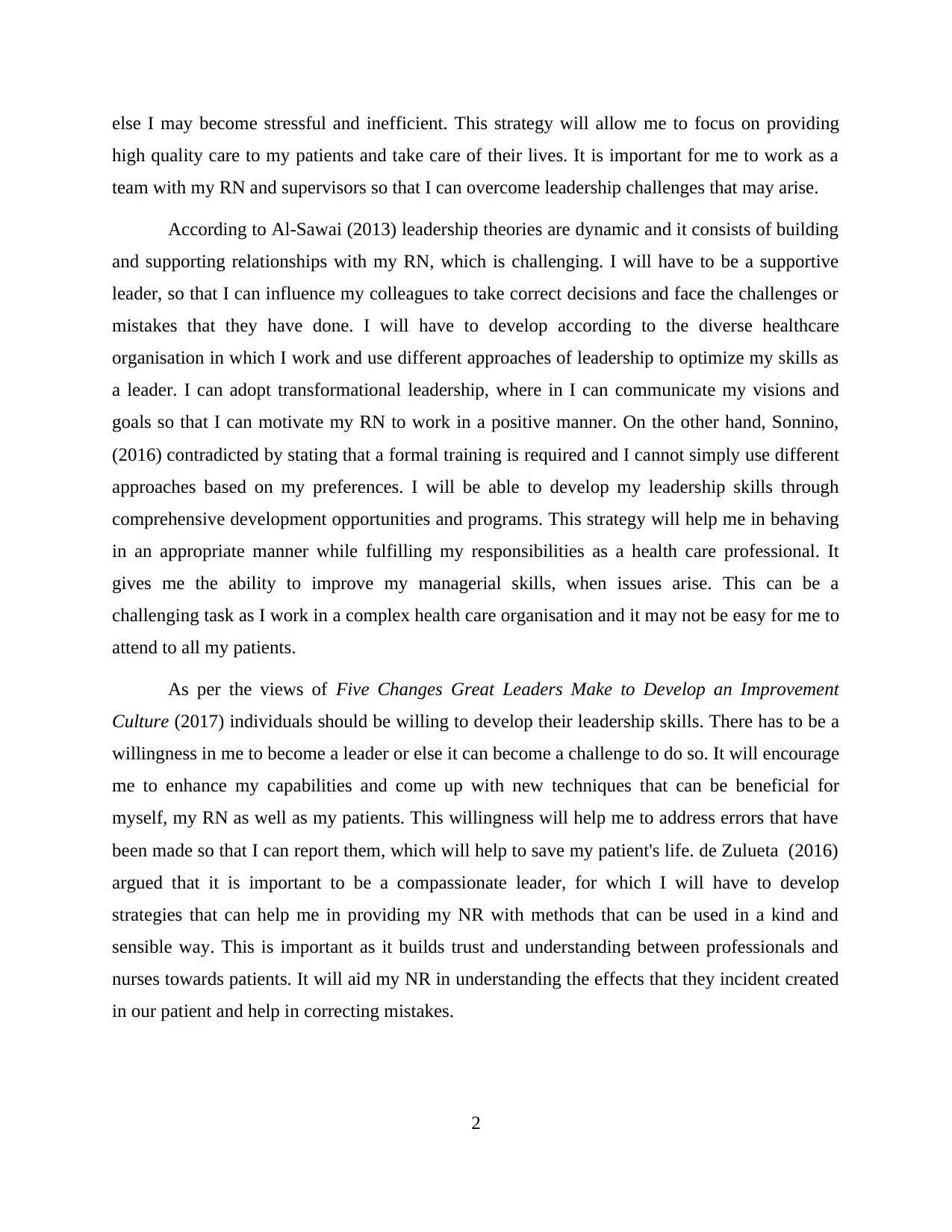
else I may become stressful and inefficient. This strategy will allow me to focus on providing
high quality care to my patients and take care of their lives. It is important for me to work as a
team with my RN and supervisors so that I can overcome leadership challenges that may arise.
According to Al-Sawai (2013) leadership theories are dynamic and it consists of building
and supporting relationships with my RN, which is challenging. I will have to be a supportive
leader, so that I can influence my colleagues to take correct decisions and face the challenges or
mistakes that they have done. I will have to develop according to the diverse healthcare
organisation in which I work and use different approaches of leadership to optimize my skills as
a leader. I can adopt transformational leadership, where in I can communicate my visions and
goals so that I can motivate my RN to work in a positive manner. On the other hand, Sonnino,
(2016) contradicted by stating that a formal training is required and I cannot simply use different
approaches based on my preferences. I will be able to develop my leadership skills through
comprehensive development opportunities and programs. This strategy will help me in behaving
in an appropriate manner while fulfilling my responsibilities as a health care professional. It
gives me the ability to improve my managerial skills, when issues arise. This can be a
challenging task as I work in a complex health care organisation and it may not be easy for me to
attend to all my patients.
As per the views of Five Changes Great Leaders Make to Develop an Improvement
Culture (2017) individuals should be willing to develop their leadership skills. There has to be a
willingness in me to become a leader or else it can become a challenge to do so. It will encourage
me to enhance my capabilities and come up with new techniques that can be beneficial for
myself, my RN as well as my patients. This willingness will help me to address errors that have
been made so that I can report them, which will help to save my patient's life. de Zulueta (2016)
argued that it is important to be a compassionate leader, for which I will have to develop
strategies that can help me in providing my NR with methods that can be used in a kind and
sensible way. This is important as it builds trust and understanding between professionals and
nurses towards patients. It will aid my NR in understanding the effects that they incident created
in our patient and help in correcting mistakes.
2
high quality care to my patients and take care of their lives. It is important for me to work as a
team with my RN and supervisors so that I can overcome leadership challenges that may arise.
According to Al-Sawai (2013) leadership theories are dynamic and it consists of building
and supporting relationships with my RN, which is challenging. I will have to be a supportive
leader, so that I can influence my colleagues to take correct decisions and face the challenges or
mistakes that they have done. I will have to develop according to the diverse healthcare
organisation in which I work and use different approaches of leadership to optimize my skills as
a leader. I can adopt transformational leadership, where in I can communicate my visions and
goals so that I can motivate my RN to work in a positive manner. On the other hand, Sonnino,
(2016) contradicted by stating that a formal training is required and I cannot simply use different
approaches based on my preferences. I will be able to develop my leadership skills through
comprehensive development opportunities and programs. This strategy will help me in behaving
in an appropriate manner while fulfilling my responsibilities as a health care professional. It
gives me the ability to improve my managerial skills, when issues arise. This can be a
challenging task as I work in a complex health care organisation and it may not be easy for me to
attend to all my patients.
As per the views of Five Changes Great Leaders Make to Develop an Improvement
Culture (2017) individuals should be willing to develop their leadership skills. There has to be a
willingness in me to become a leader or else it can become a challenge to do so. It will encourage
me to enhance my capabilities and come up with new techniques that can be beneficial for
myself, my RN as well as my patients. This willingness will help me to address errors that have
been made so that I can report them, which will help to save my patient's life. de Zulueta (2016)
argued that it is important to be a compassionate leader, for which I will have to develop
strategies that can help me in providing my NR with methods that can be used in a kind and
sensible way. This is important as it builds trust and understanding between professionals and
nurses towards patients. It will aid my NR in understanding the effects that they incident created
in our patient and help in correcting mistakes.
2
Paraphrase This Document
Need a fresh take? Get an instant paraphrase of this document with our AI Paraphraser
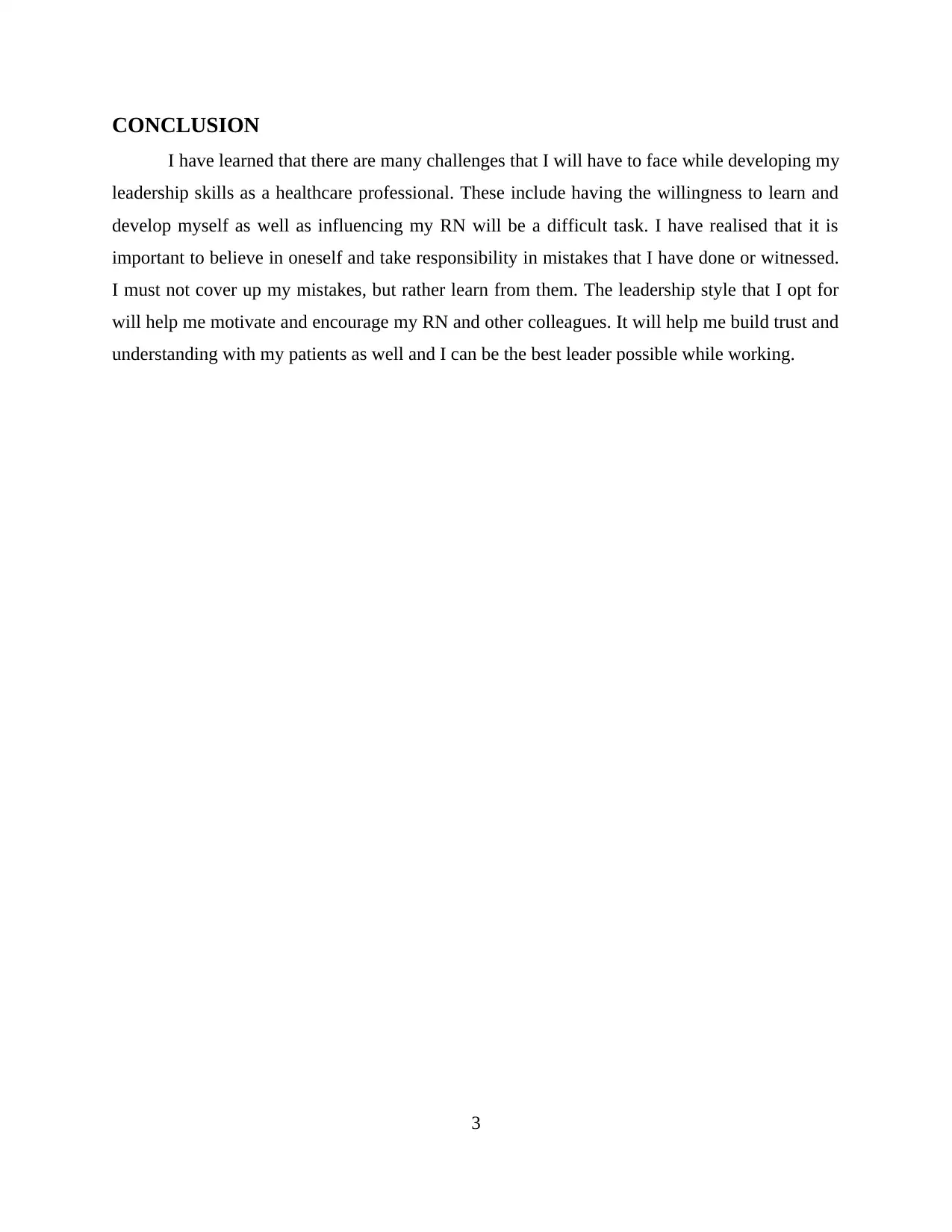
CONCLUSION
I have learned that there are many challenges that I will have to face while developing my
leadership skills as a healthcare professional. These include having the willingness to learn and
develop myself as well as influencing my RN will be a difficult task. I have realised that it is
important to believe in oneself and take responsibility in mistakes that I have done or witnessed.
I must not cover up my mistakes, but rather learn from them. The leadership style that I opt for
will help me motivate and encourage my RN and other colleagues. It will help me build trust and
understanding with my patients as well and I can be the best leader possible while working.
3
I have learned that there are many challenges that I will have to face while developing my
leadership skills as a healthcare professional. These include having the willingness to learn and
develop myself as well as influencing my RN will be a difficult task. I have realised that it is
important to believe in oneself and take responsibility in mistakes that I have done or witnessed.
I must not cover up my mistakes, but rather learn from them. The leadership style that I opt for
will help me motivate and encourage my RN and other colleagues. It will help me build trust and
understanding with my patients as well and I can be the best leader possible while working.
3
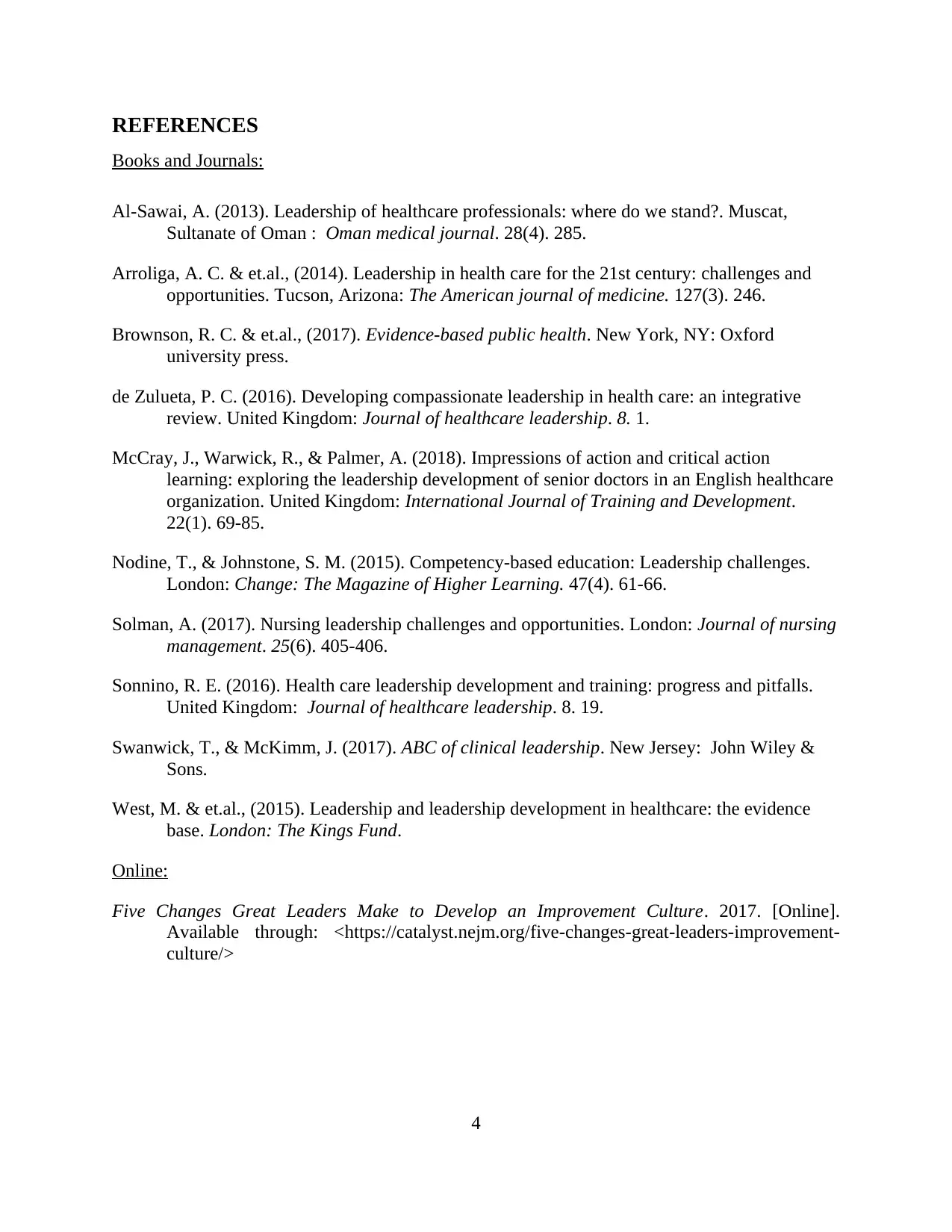
REFERENCES
Books and Journals:
Al-Sawai, A. (2013). Leadership of healthcare professionals: where do we stand?. Muscat,
Sultanate of Oman : Oman medical journal. 28(4). 285.
Arroliga, A. C. & et.al., (2014). Leadership in health care for the 21st century: challenges and
opportunities. Tucson, Arizona: The American journal of medicine. 127(3). 246.
Brownson, R. C. & et.al., (2017). Evidence-based public health. New York, NY: Oxford
university press.
de Zulueta, P. C. (2016). Developing compassionate leadership in health care: an integrative
review. United Kingdom: Journal of healthcare leadership. 8. 1.
McCray, J., Warwick, R., & Palmer, A. (2018). Impressions of action and critical action
learning: exploring the leadership development of senior doctors in an English healthcare
organization. United Kingdom: International Journal of Training and Development.
22(1). 69-85.
Nodine, T., & Johnstone, S. M. (2015). Competency-based education: Leadership challenges.
London: Change: The Magazine of Higher Learning. 47(4). 61-66.
Solman, A. (2017). Nursing leadership challenges and opportunities. London: Journal of nursing
management. 25(6). 405-406.
Sonnino, R. E. (2016). Health care leadership development and training: progress and pitfalls.
United Kingdom: Journal of healthcare leadership. 8. 19.
Swanwick, T., & McKimm, J. (2017). ABC of clinical leadership. New Jersey: John Wiley &
Sons.
West, M. & et.al., (2015). Leadership and leadership development in healthcare: the evidence
base. London: The Kings Fund.
Online:
Five Changes Great Leaders Make to Develop an Improvement Culture. 2017. [Online].
Available through: <https://catalyst.nejm.org/five-changes-great-leaders-improvement-
culture/>
4
Books and Journals:
Al-Sawai, A. (2013). Leadership of healthcare professionals: where do we stand?. Muscat,
Sultanate of Oman : Oman medical journal. 28(4). 285.
Arroliga, A. C. & et.al., (2014). Leadership in health care for the 21st century: challenges and
opportunities. Tucson, Arizona: The American journal of medicine. 127(3). 246.
Brownson, R. C. & et.al., (2017). Evidence-based public health. New York, NY: Oxford
university press.
de Zulueta, P. C. (2016). Developing compassionate leadership in health care: an integrative
review. United Kingdom: Journal of healthcare leadership. 8. 1.
McCray, J., Warwick, R., & Palmer, A. (2018). Impressions of action and critical action
learning: exploring the leadership development of senior doctors in an English healthcare
organization. United Kingdom: International Journal of Training and Development.
22(1). 69-85.
Nodine, T., & Johnstone, S. M. (2015). Competency-based education: Leadership challenges.
London: Change: The Magazine of Higher Learning. 47(4). 61-66.
Solman, A. (2017). Nursing leadership challenges and opportunities. London: Journal of nursing
management. 25(6). 405-406.
Sonnino, R. E. (2016). Health care leadership development and training: progress and pitfalls.
United Kingdom: Journal of healthcare leadership. 8. 19.
Swanwick, T., & McKimm, J. (2017). ABC of clinical leadership. New Jersey: John Wiley &
Sons.
West, M. & et.al., (2015). Leadership and leadership development in healthcare: the evidence
base. London: The Kings Fund.
Online:
Five Changes Great Leaders Make to Develop an Improvement Culture. 2017. [Online].
Available through: <https://catalyst.nejm.org/five-changes-great-leaders-improvement-
culture/>
4
⊘ This is a preview!⊘
Do you want full access?
Subscribe today to unlock all pages.

Trusted by 1+ million students worldwide

5
1 out of 7
Related Documents
Your All-in-One AI-Powered Toolkit for Academic Success.
+13062052269
info@desklib.com
Available 24*7 on WhatsApp / Email
![[object Object]](/_next/static/media/star-bottom.7253800d.svg)
Unlock your academic potential
Copyright © 2020–2025 A2Z Services. All Rights Reserved. Developed and managed by ZUCOL.





